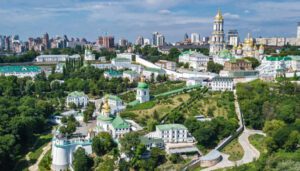
Ukraine has joined the countries of the European Union that have an approved national plan for the implementation of the principles of open science, the Ministry of Education and Science reports.
“The Government has approved the Decree “On the Approval of the National Plan for Open Science”. The document is the next step towards the integration of Ukraine into the European Research Area,” the press service of the ministry said in a statement.
It is noted that the implementation of the plan will ensure the implementation of the Agreement between Ukraine, on the one hand, and the European Union and the European Atomic Energy Community, on the other hand, on Ukraine’s participation in the Horizon Europe Research and Innovation Framework and the European Community Research and Training Program on Atomic Energy. Energy (2021 – 2025), complementary to the Horizon Europe Research and Innovation Framework.
It is expected that the subsequent implementation of the national plan for open science will create: regulatory and legal prerequisites for the formation of the state policy of open science; provide interested parties with open access to devices, tools and other means of obtaining a scientific result; will ensure the processing of scientific data, taking into account the principles of FAIR (a set of principles for the visibility, accessibility, compatibility and reuse of scientific data); will contribute to the acceleration of the circulation of scientific information, will provide access to relevant scientific information without discrimination; create conditions for more efficient use of the results of research and development carried out with the involvement of budgetary funds; will make the scientific and educational space more transparent.

Tourist tax in Kyiv for January-September 2022 amounted to UAH 47 million 360.9 thousand.
As Oleksandr Prokopenko, Deputy Director of the Department of Finance of the Kyiv City State Administration, told Interfax-Ukraine, for the same period in 2021, the tourist tax in the capital amounted to UAH 31 million 411.7 thousand. Thus, he noted, despite the war in the country, this figure is growing.

The National Bank of Ukraine (NBU) notes the presence of a number of factors on the market that contribute to the improvement of the price situation, and may reduce the inflation forecast for the current year, which was set at 31% in July, said Deputy Head of the NBU Serhiy Nikolaychuk.
Our last forecast for July (inflation) is about 30%, next year it will be about 20%. The risks are down: most likely, it will be revised (inflation forecast) a little lower, but not significantly,” he said at the Forbes conference “Without rose-colored glasses. Business and the state during the war” on Thursday.
Nikolaychuk explained that this was due, in particular, to the improvement in the situation with the supply of vegetables and fruits.
He added that fuel prices fell more than the National Bank expected, which is also related to logistics.
“The situation with the opening of ports also gives more reasons that there will be no large exchange rate fluctuations,” the deputy head of the National Bank said.
He also noted that in the July forecast, the National Bank included the introduction of an additional import duty and a higher excise tax on fuel, but these measures were not implemented, and this is also an additional deterrent effect on prices.
“Next year, the main disinflationary factor is the improvement in the ability of Ukrainian businesses to increase agricultural production, and logistics capabilities will improve,” Nikolaychuk said.
As reported, consumer price growth in Ukraine in August 2022 accelerated to 1.1% from 0.7% in July, and in annual terms, in August this year, inflation rose to 23.8% from 22.2% in July and 21.5% in June.
As reported, in 2021 inflation in Ukraine rose to 10% from 5% in 2020 and 4.1% in 2019, while core inflation rose to 7.9% against 4.5% a year earlier.
The NBU predicted an acceleration of inflation this year to 31%, including up to 25.6% in the third quarter.
Passenger flow through the western border of Ukraine in June 2022, thousand (graphically)

Data: State Border Service, graphics of the Club of Experts

The UAE authorities have changed the rules for issuing visas for foreign tourists: the validity of tourist visas has been increased to 60 days, five-year visas and other new types of documents have appeared, Gulf News reports.
“The new rules, which expand the opportunities for traveling to the country, came into force on October 3. Updating the visa issuance system will streamline the process of obtaining entry documents and meet the needs of all categories of foreigners and tourists in the future. It is aimed at increasing the population of the UAE through qualified entrepreneurs , scientists, successful students and graduates, workers,” the newspaper writes.
According to the portal, the validity of tourist visas has been extended from 30 to 60 days. It is also now possible to apply for a five-year multi-visa tourist, which will allow foreigners to stay in the UAE for 180 days a year or 90 days in a row. Foreigners can apply for a visa directly and the visa fee is 650 dirhams or $177. The application can be submitted through the UAEICP application.
The UAE authorities have also approved a new type of visa – a five-year resident Green Residence. Holders of such a visa will be able to sponsor their close relatives and easily obtain a residence permit for themselves and family members. Three categories of foreign citizens will be able to obtain such a visa: freelancers / self-employed, qualified employees, investors and partners.
“The UAE has also introduced visas to explore labor market opportunities and another type to explore investment and business opportunities without the need for confirmation from a sponsor or host,” writes Gulf News.
According to the publication, the new visa policy expands the opportunities for UAE Golden Visa holders and allows job seekers to enter the country with flexible visit periods and a simple extension of up to one year without the requirement of a sponsor or employer.